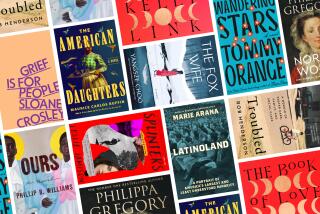FIRST FICTION
- Share via
One Pill Makes
You Smaller
Lisa Dierbeck
Farrar, Straus & Giroux:
320 pp., $24
How queer it all seems to 11-year-old Alice Duncan. She lives with her Aunt Esme (who’s actually her teenage half sister) on E. 67th Street in Manhattan. Morning, noon and night, the house is full of kids sitting around listening to Led Zeppelin’s “Houses of the Holy,” getting stoned and succumbing to the munchies. Her father, an influential painter, is stuck in a Connecticut loony bin, and her mother has run off with another man. At school, Alice is known by the nickname Gigantor: Despite her age, she already has a woman’s buxom body, and Esme’s stoner pal Rabbit frequently cajoles her into performing sexual tasks upon him. When she’s not engaged in these fleeting chores, she’s making collages -- cutting up magazines and replacing rock stars’ eyes with random images. It’s 1976.
Lisa Dierbeck invites us on a journey down the Me Decade rabbit hole in this mischievous recasting of “Alice in Wonderland.” Thankfully, “One Pill Makes You Smaller” isn’t a blow-by-blow update of Lewis Carroll. Yes, there’s a Rabbit, a “Drink Me” episode and allusions to the looking glass. But Carroll is a mere jumping-off point for this Alice’s trip and for Dierbeck’s ruminations on the porous boundary between innocence and experience.
For Alice, matters get curiouser and curiouser when Esme secures for her a free ride at the Balthus Institute, a summer art program in North Carolina. Here, Alice, dressed like a hooker (she thinks she looks grown up), expects to enjoy age-appropriate camp activities. Instead, she’s sucked headfirst into debates about Abstract Expressionism, critique sessions with rivalrous teen artistes and a creepy pas de deux with a drug dealer named J.D.
It’s tempting to dismiss “One Pill Makes You Smaller” as a muddled fable. But Dierbeck is passionate, observant and funny enough to carry it off. She craftily positions Alice as a child lost in an adult universe defined by childishness. Her Alice is wide-eyed and naive enough to see through a looking glass world of sexual predators and artistic frauds, even if she’s helpless to stave it off. “Was there no escape from the perpetual Led Zeppelin?” Alice wonders. Like everyone else, she learns the hard way that the answer is no.
*
A Sunday at the
Pool in Kigali
Gil Courtemanche
Translated from the French
by Patricia Claxton
Alfred A. Knopf: 262 pp., $23
Gil Courtemanche is a reporter and columnist for Montreal’s Le Devoir. His first novel comes equipped with a disclaimer that his “characters all existed in reality.” Without such a preamble, one might accuse Courtemanche of hyperbole as he re-creates the months leading up to the ethnic violence that ripped through Rwanda in April 1994.
Those brutal days become the blood-soaked backdrop to a Romeo and Juliet love affair between a middle-aged Quebecois television journalist named Bernard Valcourt, and Gentille, a lithe waitress at the Kigali hotel where Valcourt lives. Here, Valcourt drinks Primus beer and hangs out around the pool with various Third World comers and goers: U.N. functionaries, bemused locals, AIDS victims and an endless stream of prostitutes. Gentille, for her part, is a Hutu (the majority oppressor) who happens to look like a Tutsi, placing her in mortal danger and making her an embodiment of the absurdity of Rwanda’s struggles with itself.
“A Sunday at the Pool in Kigali” -- the title refers both to the sleepy normalcy of the hotel enclave and also to the star-crossed lovers’ climactic wedding day -- unfolds like a series of Sunday magazine set pieces, each as striking as it is awkward. Despite Courtemanche’s skillful (and, again, allegedly non-hyperbolic) reportage, he has a fatal fondness for caricature: It isn’t enough for a naive Canadian official to be clueless, he must also be made a cuckold; Hutus are beer-belching, priapic cartoons; and Gentille is an exotic sexpot who is able to achieve orgasm merely by listening to Valcourt recite the poetry of Paul Eluard. Two false endings don’t help either, making this more an unending catalog of horrors -- both narrative and historical -- than the novel Rwanda deserves.
More to Read
Sign up for our Book Club newsletter
Get the latest news, events and more from the Los Angeles Times Book Club, and help us get L.A. reading and talking.
You may occasionally receive promotional content from the Los Angeles Times.









